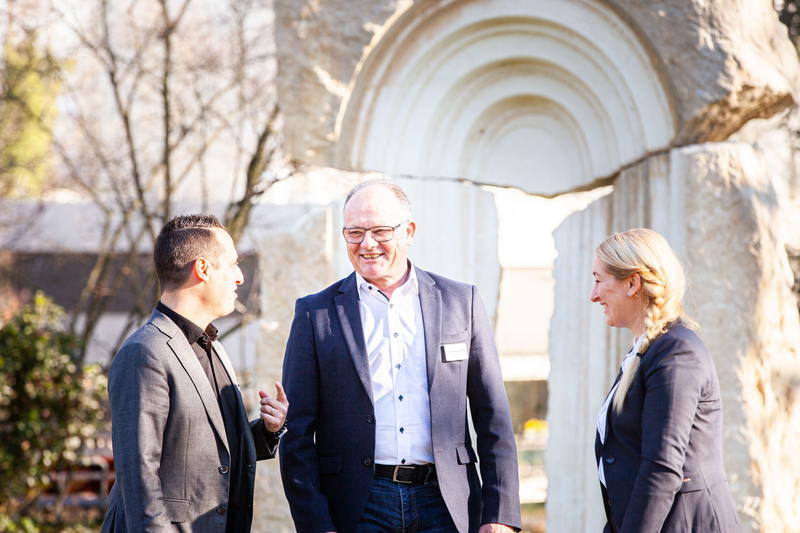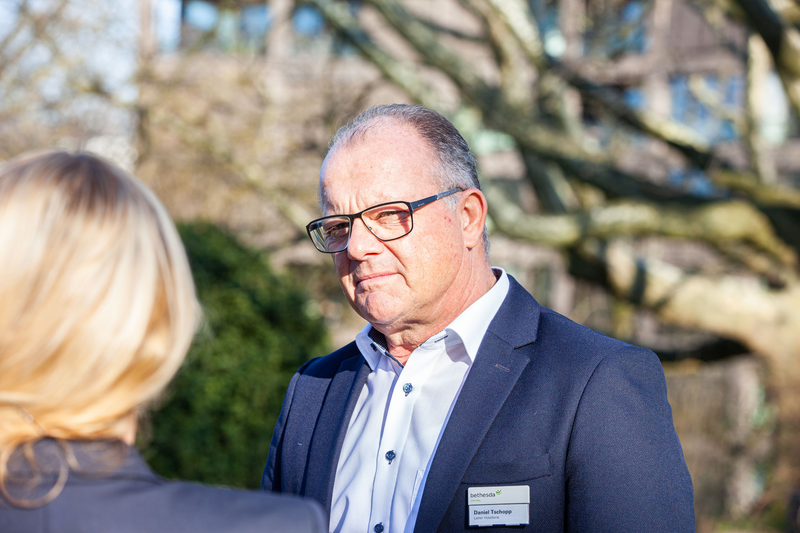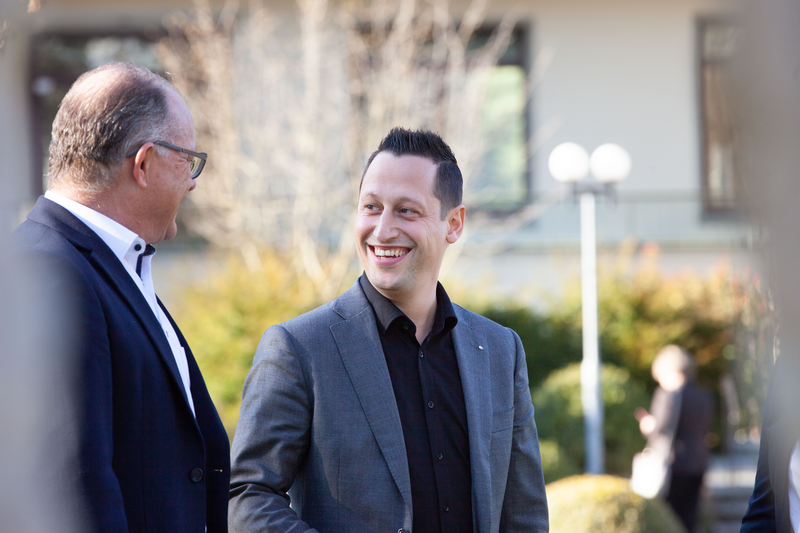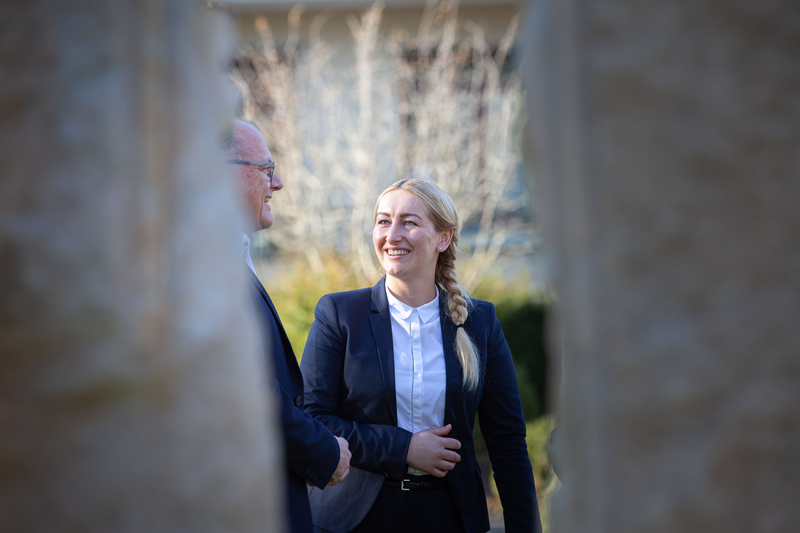You all know Bethesda Hospital as a place of work – and also a place where you have been a patient?
Nuno Cruz:
Not directly, but both my children were born here. I knew the excellent standard of this hospital so well, that there was no debate for my wife and me about where our children should be born. With our first child, we even had a family room where I was able to experience my family’s first three days and nights round the clock. That was a marvellous feeling.
Daniel Tschopp:
That was when I got to know Nuno Cruz from his personal side – as a brand new, proud father. I visited him and his family on the very first day. That was lovely, especially if you are usually working intensively with each other.
You’ve never been in a patient’s bed at Bethesda Hospital, Mr Tschopp?
Daniel Tschopp:
Yes, but not as a patient. I’m too healthy for that (laughs). But a few years ago we assessed some new patient beds, and I took part in the sleeping trial session – with the ISS property manager at the time, as it happens. We even travelled to the bed factory in Dresden. We always involve ISS in investments like that, which have follow-up costs for operation.
Martina Fässler:
This is a good example of how important different perspectives are for sustainable solutions: the sleeping trial offered the patient perspective, and because Mr Tschopp included ISS, the operating costs of such an investment, for example for bed maintenance, were also factored in.
Mr Tschopp, the partnership between Bethesda Hospital and ISS is celebrating its 25th birthday this year. How did this story begin?
Daniel Tschopp:
In 1996, Bethesda’s management decided to focus on the core business and outsource other areas such as maintenance cleaning. This was a radical step for a private hospital with a religious history, because for decades nuns – and a few doctors – had been responsible for everything here.
ISS took over the entire cleaning staff at Bethesda Hospital. Was there any resistance to outsourcing?
Daniel Tschopp:
Yes, there was. And it didn’t help that the standard of cleaning didn’t meet our expectations at the beginning. I remember well an intense discussion I had in this very restaurant in 1999 with André Nauer, who at the time was not yet CEO. I even threatened to quit. André Nauer replied: “Give me a month and it’ll be fine,” and it was. Since then, we have had a constructive and successful partnership with ISS, though we do have tough discussions when we disagree.
Nuno Cruz, the healthcare sector is under constant cost pressure. How does that affect collaboration?
Nuno Cruz:
We are also under pressure from costs. There are also trends such as “outpatient before inpatient”, which increase numbers of patients and thus the amount of cleaning needed. That’s why one of our main tasks is constantly to refine and improve our processes. For example, we noticed that when a hospital discharge is postponed from the morning to the afternoon, we often duplicate our effort by cleaning that room twice. Our solution: at Daniel Tschopp’s suggestion, we have extended the time window for room cleaning into the afternoon to be able to react more flexibly.
Martina Fässler:
We have implemented Monitoring@ISS, a tool developed by the ISS Group which allows us to send employees their work schedules or short-term orders directly to their smartphones. By cooperating closely with Antje Klimach, Head of Room Service Bethesda, we have been able to automate exit management by electronically recording every exit and scheduling the cleaning. This means we can be flexible and cuts costs while maintaining the same level of service. In addition Monitoring@ISS will provide customers in the future with even better, data-based quality control of our services and absolute transparency in KPIs.
Martina Fässler, what distinguishes ISS employees in the healthcare sector?
Martina Fässler:
They are specially trained, for example in hygiene or in sensitive contact with patients. We should never forget that in a hospital we will again and again encounter people in extreme situations.
Daniel Tschopp:
And in such situations, our patients don’t distinguish whether it is a Bethesda Hospital employee or an ISS employee who is in front of them. This means that each and every ISS employee must share our culture. We are one team, which is why ISS employees receive Christmas presents from us just like Bethesda Hospital employees.
Martina Fässler:
In addition, some ISS employees have to be able to take over different services, so that we can offer our customers the most services possible, as efficiently as possible. This means further training, for example in data security, to be able to take over the postal service.
Nuno Cruz:
Many staff also see this as an opportunity, as it helps them develop and they become more valuable to the company. This brings a positive dynamic that is also rewarded by ISS and the customer.
Daniel Tschopp:
The Covid-19 pandemic in particular showed how important this flexibility is. Employees of ISS and Bethesda Hospital were constantly having to compensate for absences and stand in for others. But even without Covid-19, flexibility brings more efficiency. In the past, a Bethesda employee was responsible for internal mail dispatch on a 30% basis. If he was sick or on holiday, we had a problem. So should we have filled two 30% positions? That would have been much more expensive than delegating this service to ISS. The same goes for selective support services for events. It’s great that ISS gives me the feeling, as head of hotel operations and logistics, that I can actually perform any facility management task as needed.
So cost pressure is also an opportunity for ISS?
Nuno Cruz:
Yes, for sure. In the past, ISS simply provided services; today, we need to support the customer's core business successfully from the customer's point of view – on the one hand, by further optimising our performance mandate alongside well-established processes, and on the other hand, by having a good look to see where else we can contribute our expertise.
Daniel Tschopp:
This also applies to structural measures. Today, if we are laying new floors, we bring ISS on board, because ISS colleagues will be cleaning these floors for years to come, and they know how cost-intensive this will be with certain materials. Operating costs are a significant cost block in a hospital. ISS can contribute a lot of know-how to help us save money in the future.
Speaking of the future – what is the argument for Bethesda Hospital and ISS still being partners 25 years from now?
Martina Fässler:
As in any partnership, it is important that both partners develop – with each other, but also each for themselves. My job is to look beyond Bethesda Hospital and see what works well in other healthcare institutions. In addition, I make sure that technological innovations from the ISS Group are shared widely – for example Monitoring@ISS.
Daniel Tschopp:
Our partnership is based on transparency, trust, mutual development and sustainable growth. These are values that are not only important to ISS and Bethesda Hospital, but also values that serve our patients, those who have recently given birth, and our employees. This means that together, we are creating the ideal conditions so we can continue to work together.



